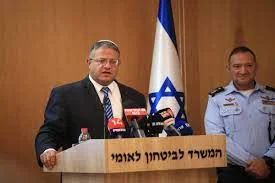Criticism of US President Joe Biden by a far-right minister in Israel's government who said Donald Trump would allow more freedom to fight Hamas sparked outrage there on Sunday, highlighting the sensitivity of relations as Washington provides key support for the offensive against the militants in Gaza.
The Biden administration has skirted Congress to rush weapons to Israel and shielded its ally from international calls for a cease-fire in the four months since Hamas' October 7 attack that triggered the war.
But the White House has also urged Israel to take greater measures to avoid harming civilians and to facilitate the delivery of more aid to besieged Gaza.
Itamar Ben-Gvir, Israel's national security minister, in an interview with The Wall Street Journal said Biden was hindering Israel's war effort.
“Instead of giving us his full backing, Biden is busy with giving humanitarian aid and fuel (to Gaza), which goes to Hamas,” Ben-Gvir said. “If Trump was in power, the US conduct would be completely different.”
His remarks drew fire from Benny Gantz, a retired general and member of Netanyahu's three-man War Cabinet, who said Ben-Gvir was “causing tremendous damage” to American-Israeli relations. Opposition leader Yair Lapid, also posting on X, said Ben-Gvir's remarks prove that he “does not understand foreign relations.”
The Palestinian Foreign Ministry condemned Ben-Gvir's comments as “racist” and called for international sanctions against him, saying he threatens the region's stability
Netanyahu, without mentioning Ben-Gvir by name, appeared to refer to his remarks when addressing a weekly Cabinet meeting.
The prime minister thanked Biden for his support while highlighting his own experience of dealing with multiple US administrations' approaches to Israel's most important alliance.
“There are those who say 'no' to everything, receiving applause at home, but they're also endangering vital interests,” he said.
Ben-Gvir, along with other far-right figures, has called for “voluntary” mass emigration of Palestinians from Gaza and for the return of Jewish settlements, which Israel dismantled when it withdrew troops from the territory in 2005. The Biden administration is opposed to any such scenario.
Ben-Gvir and other key members of Netanyahu's governing coalition have threatened to bring down the government if they believe he is too soft on Hamas.
Netanyahu told the Cabinet that the military was carrying out “very aggressive raids” in northern and central Gaza while dealing with remaining Hamas battalions around Gaza's southernmost city of Rafah.
The war in Gaza has levelled vast swaths of the tiny enclave, displaced 85 per cent of its population and pushed a quarter of residents to starvation.
The Health Ministry in Gaza said 127 bodies had been brought to hospitals in the last 24 hours, bringing the overall death toll to 27,365. The ministry does not distinguish between civilians and combatants but says most of those killed were women and children.
In central Gaza, Israeli airstrikes hit a house and mosque in Deir al-Balah and killed 15 people and wounded at least 45 others including children, according to an Associated Press journalist at the scene. At Aqsa Martyrs Hospital, a man wept next to a body covered in blankets.
Other Palestinians found shelter at the hospital but little relief. “Someone like me has been here for three months or two-and-a-half months, and I haven't had a shower. What can we do? We want to go back to our home,” said Basemah Al-Haddad, who was displaced from Gaza City.
Two children were killed in separate airstrikes in Rafah, according to the registration office at the hospital where the bodies were taken. The first hit a house in the Jeneina refugee camp and killed a 12-year-old. The second hit a room west of the Rafah border crossing, killing a 2-year-old.
The bodies lay on the hospital floor. A female relative bent down to gently touch one child's face.
More aid to Gaza will be a “top priority” as US Secretary of State Antony Blinken makes his latest visit to the region, Biden's national security adviser, Jake Sullivan, told CBS.
Another focus is Israel's tense negotiations mediated by the US, Qatar and Egypt aimed at freeing more than 100 remaining captives taken in the October 7 Hamas attack in return for a cease-fire and the release of Palestinians jailed in Israel.
“It's up to Hamas to come forward and respond to what is a serious proposal,” Sullivan told NBC, adding there is no clear idea how many of the hostages remain alive.
Hamas and other militants killed some 1,200 people, mostly civilians, in the October 7 attack and abducted around 250.
More than 100 captives, mostly women and children, were released during a weeklong cease-fire in November in exchange for the release of 240 Palestinians imprisoned by Israel.
Hamas has said it won't release any more hostages until Israel ends its offensive. It also demands the release of thousands of Palestinian prisoners. Netanyahu has publicly ruled out both demands.Hamas is expected to respond to the latest cease-fire offer in the coming days.

